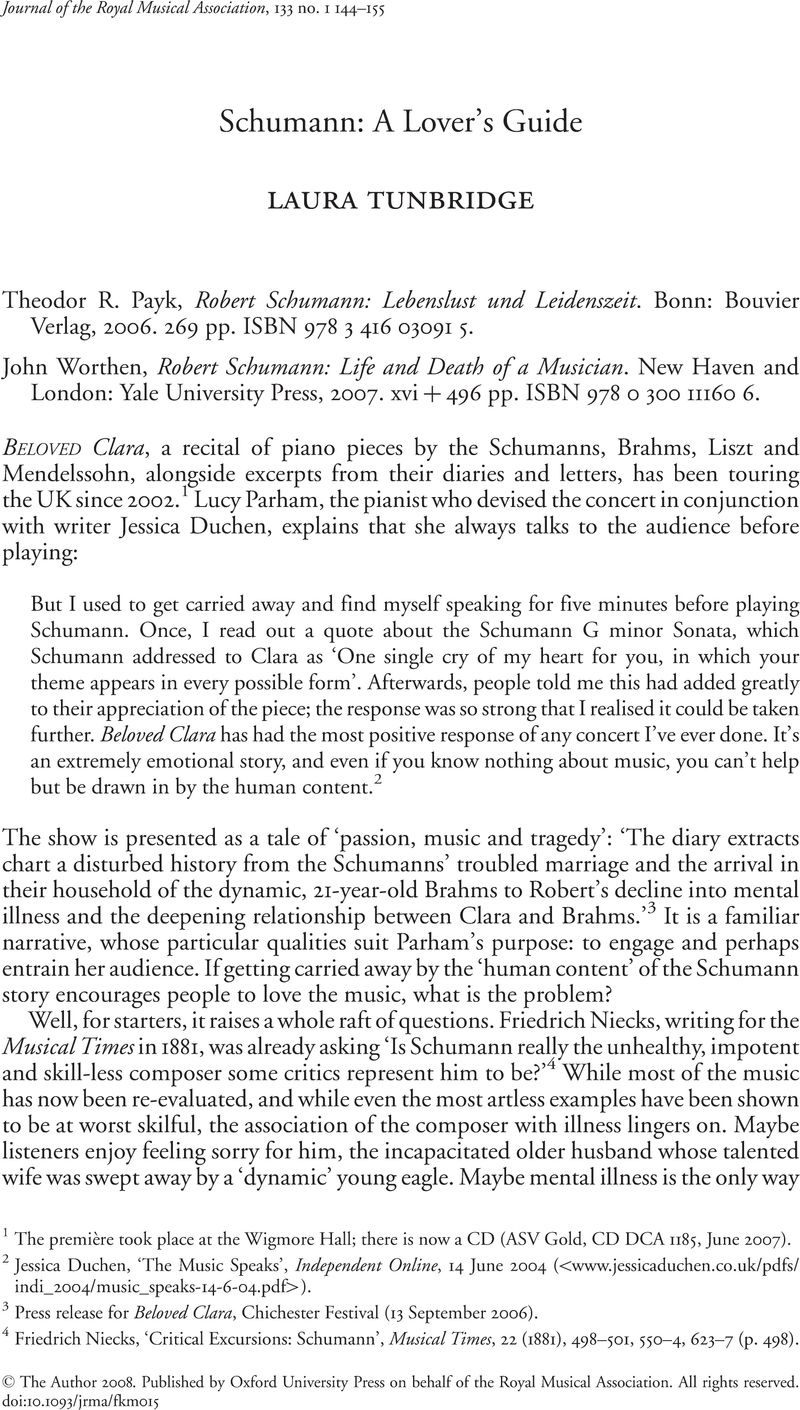No CrossRef data available.
Published online by Cambridge University Press: 01 January 2020

1 The première took place at the Wigmore Hall; there is now a CD (ASV Gold, CD DCA 1185, June 2007).Google Scholar
2 Jessica Duchen, ‘The Music Speaks’, Independent Online, 14 June 2004 (<www.jessicaduchen.co.uk/pdfs/indi_2004/music_speaks-14-6-04.pdf>).).>Google Scholar
3 Press release for Beloved Clara, Chichester Festival (13 September 2006).Google Scholar
4 Friedrich Niecks, ‘Critical Excursions: Schumann’, Musical Times, 22 (1881), 498–501, 550–4, 623–7 (p. 498).Google Scholar
5 Robert Schumann in Endenich (1854–1856): Krankenakten, Briefzeugnisse und zeitgenössische Berichte, ed. Bernhard R Appel, Schumann Forschungen, 11 (Mainz, 2006). Eric Frederick Jensen published a selection of translated extracts as ‘Schumann at Endenich: Buried Alive’, Musical Times, 139 (1998), no. 1861, 10–18; no. 1862, 14–23.Google Scholar
6 Most recently Roland Schiffter has argued that Schumann was only schizophrenic, with syphilis playing no part in his death; see his ‘Das Leiden Robert Schumanns’, ‘Das letzte Wort der Kunst’: Heinrich Heine und Robert Schumann zum 150. Todesjahr, ed. Joseph A. Kruse (Stuttgart, 2006), 267–77 (p- 275).Google Scholar
7 John Daverio, Robert Schumann: Herald of ‘A New Poetic Age‘ (Oxford, 1997), 488.Google Scholar
8 Robert and Clara Schumann, Briefwechsel: Kritische Gesamtausgabe, ed. Eva Weissweiler (Basle, 1984), i, 95–6.Google Scholar
9 Ludwig Wittgenstein, Philosophical Investigations, trans. G. E. M. Anscombe (rev. edn, London, 2001), 403.Google Scholar
10 Incidentally, lightning pains ‘like the twanging of a fiddle string’ most commonly in the legs are a feature of tabes dorsalis, another form of tertiary syphilis.Google Scholar
11 See in particular Kay Redfield Jamison, Touched with Fire: Manic-Depressive Illness and the Artistic Temperament (London, 1996).Google Scholar
12 Robert Schumann, ‘New Paths’, trans. Henry Pleasants, Robert Schumann: Schumann on Music (New York, 1988), 198–200 (p. 199).Google Scholar
13 In this regard it is striking that Worthen gives as support for his reading of the op. 60 fugues as therapeutic Eric Frederick Jensen's biography Schumann (Oxford, 2001). Jensen's account concentrates on the composer's mental illness rather than the possibility of his having died from syphilis, which Worthen would presumably reject. Why then take on his similarly romantic reading of the music?Google Scholar
14 John Daverio, Robert Schumann: ‘Herald of a New Poetic Age‘ (Oxford, 1997), 492.Google Scholar
15 Roland Barthes, ‘Loving Schumann (1979)‘, The Responsibility of Forms: Critical Essays on Music, Art, and Representation, trans. Richard Howard (Berkeley, CA, 1985), 293–8 (p. 298).Google Scholar